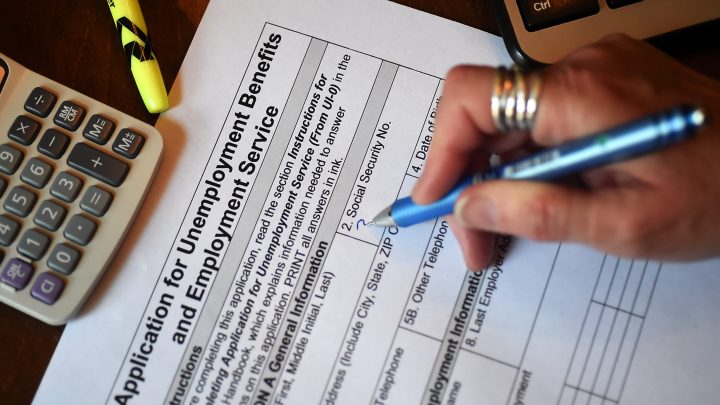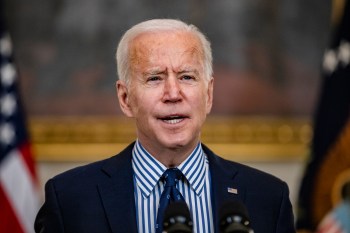
Why hasn’t Congress fixed unemployment insurance?
Why hasn’t Congress fixed unemployment insurance?

The unemployment insurance system in the United States is 85 years old; its last major overhaul was in 1976. But those reforms more than 40 years ago left many issues unresolved, even though congressional commissions have studied them twice since then.
During recessions, Congress has relied on temporary programs to make up for the failings of unemployment insurance instead of permanent solutions, according to a study by the Upjohn Institute for Employment Research. The Coronavirus Aid, Relief and Economic Security Act, passed in March, is one such measure.
The CARES Act created unemployment benefits for people who wouldn’t traditionally qualify for them, like gig workers and self-employed workers. It also allows some people to claim an additional 13 weeks of payments. But those programs are set to expire Dec. 26. As Congress continues to negotiate another relief package, “Marketplace” host Kai Ryssdal spoke to Dr. Kathryn Edwards, a labor economist at the Rand Corp., about the structure of the UI system. Below is an edited transcript of their conversation.
Kai Ryssdal: So when the economy started going south back in late February, early March, and those of us who don’t study the labor market and unemployment saw the crater that was happening, I think a lot of people were caught unawares. Were you surprised at all, that the unemployment system sort of got overwhelmed?
Kathryn Edwards: No, because the problems with the system have been known for decades. The real weakness in unemployment insurance is that the people who financed the program, and the people who administer the program are better off when fewer people receive benefits, right? Your state has to finance a tax on its employer base in order to pay for benefits, and states don’t like doing this. I mean, you can imagine the Amazon headquarters search. They said one of the components of their process would be what the employer tax was in the state. When Congress saw that a recession was coming, it knew exactly what it had to fix. And they did it. They did it all in the single legislation. Unfortunately, they had it all expire.
Ryssdal: Right, which gets us to the current moment where there is so much peril as Congress decides what it’s going to do.
Edwards: Yes, I often joke with my friends that perhaps Congress just has a flair for high drama, which is why they keep on establishing benefits in the middle of recession and then threatening to take them away, but possibly extending. It’s not a very fair thing to do for the families who are relying so entirely on these benefits, because there is no job to be found.
Ryssdal: How much of the, well, I’m gonna say dysfunction, you may disagree, because arguably, it’s working. But how much of the dysfunction of the unemployment insurance program is because it’s kind of a state and federal hybrid?
Edwards: I would argue, especially in terms of fraud, it’s most of it. But on the benefit side, when you allow benefits to vary across state, you create a wedge between what someone earned and what they get in a benefit, right? So if I were to apply for Social Security, old age insurance, tomorrow, and I found out that because I lived in Texas, I got half of what I would have gotten had I lived in Oklahoma, right, people would be incredibly upset. And they wouldn’t be able to believe that this benefit that you paid for and worked for is ultimately going to be filtered through what your state feels is worthy, right? It should be based on you. We do that for old age insurance. But we don’t do that for unemployment insurance.
Ryssdal: Yeah, so given that, on the one hand, we tried to reform or fix the unemployment insurance system in this country, several times over the past five decades. But on the other hand, we saw Congress in March, work unbelievably quickly to shovel trillions of dollars out the door when it was desperately needed in unemployment and business support. What’s your confidence level in finally being able to rectify the wrongs?
Edwards: You know, the question you’re asking me is, have we reached a turning point? One thing that the CARES Act included that I thought was pretty incredible was that it added to the reasons for unemployment insurance caring for another person, caring for someone who had COVID-19 or caring for schoolchildren that had no other option. So my hope would be that we would act boldly and broadly in thinking not just “Here’s this program that’s a joint state, that has eroded benefits,” but “We have an economy that has risk that workers are exposed to that we should cover efficiently because that’s the best investment for the economy.”
There’s a lot happening in the world. Through it all, Marketplace is here for you.
You rely on Marketplace to break down the world’s events and tell you how it affects you in a fact-based, approachable way. We rely on your financial support to keep making that possible.
Your donation today powers the independent journalism that you rely on. For just $5/month, you can help sustain Marketplace so we can keep reporting on the things that matter to you.


















